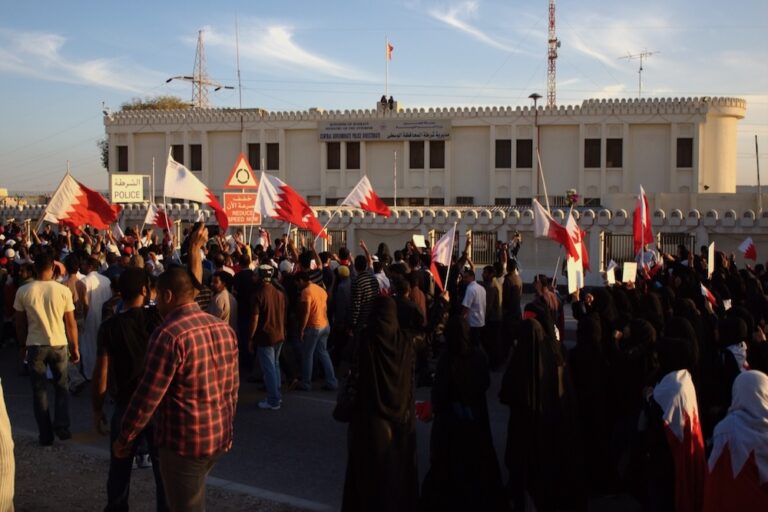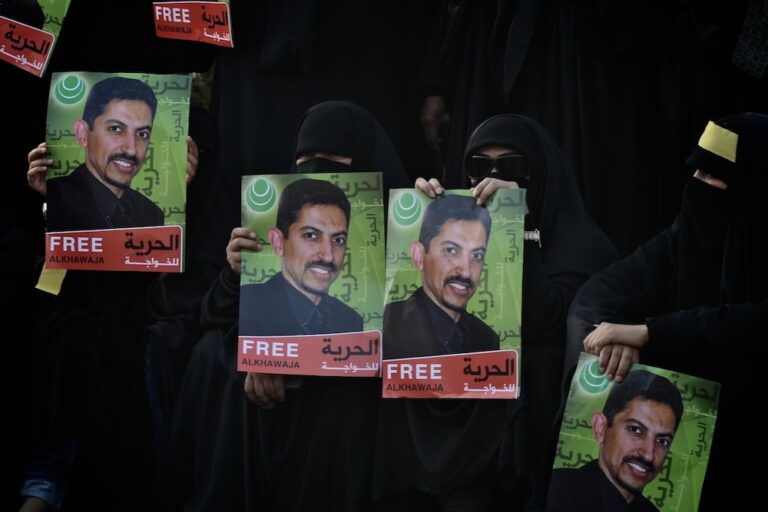"The state is now unabashedly terrorising anyone, including doctors, who dared to support pro-democracy protesters during the past several weeks," says Human Rights Watch.
(Human Rights Watch/ IFEX) – Manama, March 21, 2011 – Bahrain should end its campaign of arrests of doctors and human rights activists, Human Rights Watch said today.
On March 19-20, 2011, state security forces, often masked and in civilian dress, arrested four medical doctors and two human rights activists, and sought the arrest of a third. Human Rights Watch also remains concerned about the whereabouts of those doctors and rights advocates still in detention. The arrests, some of which occurred during pre-dawn hours, appear part of a broader government crackdown involving nighttime raids on the homes of those viewed as supporting pro-democracy protesters, Human Rights Watch said.
“Nighttime raids by masked men accompanied by uniformed security personnel have become disturbingly familiar in Bahrain,” said Joe Stork, deputy Middle East director at Human Rights Watch. “The state is now unabashedly terrorizing anyone, including doctors, who dared to support pro-democracy protesters during the past several weeks.”
A credible source who asked not to be identified for security reasons told Human Rights Watch that on March 19, security forces arrested four doctors who had been publicly critical of the government. Dr. Ghassan Dhaif and his wife, Dr. Zahra al-Sammak, were stopped at Bahrain International Airport as they attempted to leave the country. While al-Sammak was released, at the time of this writing Ghassan Dhaif remains in custody. Sources also told Human Rights Watch that security forces also arrested Ghassan’s brother, Dr. Bassam Dhaif, who worked at the Salmaniya Medical Complex.
At around 2:45 a.m. the same day, security forces raided the home of Dr. Nada Dhaif, who had appeared on an Al Jazeera broadcast speaking about events in Bahrain, and arrested her. Earlier the security forces had gone to her parent’s home. Nada Dhaif’s whereabouts, like those of the Dhaif brothers, who are her cousins, remain unknown.
Nabeel Rajab, the president of the Bahrain Center for Human Rights (BCHR), told Human Rights Watch that at about 1:30a.m. on March 20, 20 to 25 men, some armed with rifles and their faces covered, along with dozens of uniformed riot police, came to his house. They broke down the door, detained him and confiscated his files and a computer. Rajab said security personnel hooded and handcuffed him in the back of a vehicle, where they verbally abused, kicked, and punched him, and in one instance threatened to sexually assault him. They eventually took him to a detention facility run by the Ministry of Interior in Adliya, a suburb of the capital, Manama, where an officer questioned him about a man being sought whom Rajab did not know. After some further questioning, the officers released him without bringing any charges. Rajab is a member of the Middle East advisory committee of Human Rights Watch.
About an hour later, at around 2:30 a.m., a group of plainclothes masked men and riot police went to the home of Sayid Yousif al-Muhafdah, another BCHR staffer, but he was at another location. According to al-Muhafdah, his family told him that about 25 men entered and searched their home. On departing, security officers warned the family to “tell Sayid Yousif to come to the police station or we will come back every night.”
A second credible source told Human Rights Watch that security forces arrested another BCHR member, Mohammed Sultan, on March 19. A BCHR board member, Mohammed Saeed al-Sahlawi, has not been heard from in several days, but Human Rights Watch has not been able to confirm whether he has also been arrested or has instead gone into hiding. BCHR has long been critical of Bahrain’s government. In 2004, authorities shut down BCHR following the arrest of its then-president, Abdul-Hadi al-Khawaja, after he publicly criticized the prime minister.
The recent arrests appear part of a broader government crackdown, Human Rights Watch said. Since March 17, many opposition political activists and local rights defenders have slept away from their homes or gone into hiding to avoid arrest or harassment. Several have sought to leave the country following threats against them on Facebook, Twitter, and other social media sites.
Over the past week Human Rights Watch has been able to confirm the apparent arbitrary arrests of an additional 10 people, including seven political activists, two doctors (Ali Alekry, Mahmoud Asghar) and one rights activist (Seyed Ahmed al-Wedai). Human Rights Watch believes that the actual number of those arrested may be higher, and is seeking to determine whether some of the individuals reported missing are actually being detained.
The United Nations Declaration on Human Rights Defenders urges all states to “take all necessary measures to ensure the protection of everyone against any violence, threats, retaliation, adverse discrimination, pressure or any other arbitrary action” as a result of their participation in human rights activity.
“Bahrain is rapidly reverting to the police state of the 1990s,” said Stork. “The authorities should stop arresting rights activists and doctors who speak out against abuses, and release all those improperly detained.”


